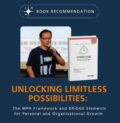The leadership skills for fresh graduates
The MPH Framework:
1. Mindsets:
– Self-awareness: Recognizing strengths, weaknesses, and areas for growth shapes the right mindset for continuous improvement.
– Adaptability: Being open to change and learning cultivates a growth mindset that allows graduates to embrace challenges.
2. Passion and Purpose:
– Initiative: Aligning personal passions with career goals leads to taking the initiative, showing drive, and pursuing opportunities that fulfill their purpose.
– Resilience: Staying committed to long-term goals even when faced with setbacks reflects a strong sense of purpose and determination.
3. Effective Habits:
– Time Management: Building the habit of prioritizing tasks efficiently ensures productivity.
– Problem-solving: Approaching problems methodically becomes a habitual practice that enhances decision-making in both job hunting and career progression.
-BRIDGE Elements:
1. Branding:
– Networking: Building a personal brand through professional networks showcases graduates as credible, resourceful, and engaged in their field.
– Communication: Clear and compelling communication is key to personal branding during interviews and networking.
2. Right Attitude:
– Adaptability: Showing willingness to learn and flexibility in challenging situations demonstrates a positive attitude that appeals to employers.
– Resilience: A can-do attitude and the ability to bounce back from rejection or failure reflect persistence and positivity.
3. Interpersonal Skills and Networking:
– Teamwork: Working effectively with others enhances collaboration and fosters strong workplace relationships.
– Networking: Building connections both within and outside the organization can expand opportunities and professional influence.
4. Self-Development:
– Initiative: Proactively seeking growth opportunities, such as additional certifications or internships, reflects a commitment to continuous development.
– Self-awareness: Understanding personal strengths and areas for improvement aids in targeted self-development.
5. Gaining Influence through Political Savvy:
– Problem-solving: Demonstrating an ability to navigate complex problems helps in gaining influence and respect within the organization.
– Networking: Strategic networking and building alliances provide graduates with political savvy that helps them succeed.
6. EQ (Emotional Intelligence):
– Emotional Intelligence (EQ): Managing emotions and showing empathy towards others improves interpersonal relationships and team dynamics, key aspects of EQ.
– Resilience: Emotional resilience helps graduates handle stress, remain focused, and maintain relationships despite challenges.
By categorizing leadership skills this way, fresh graduates can focus on honing each aspect of their development under the MPH Framework and BRIDGE Elements, ensuring a well-rounded and impactful approach to both job hunting and career success.
~YK Png (FPSS. PCTC. ACLP)
#LeadershipDevelopment #CareerSuccess #CareerTips #ProfessionalDevelopment #CoachToring #Coaching

